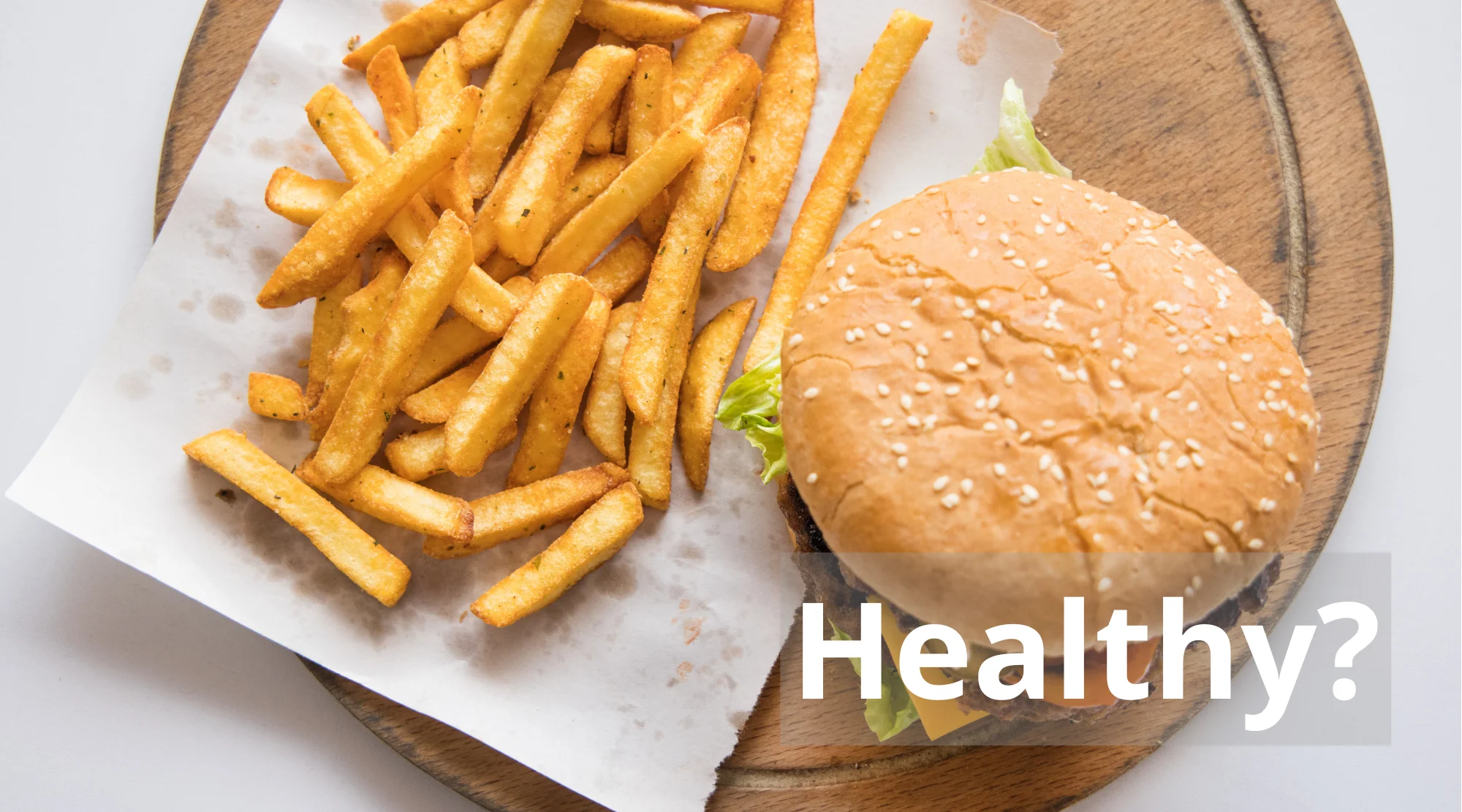Fast Food and a Balanced Diet: Can They Coexist?
The struggle is real. You’re striving for a healthier lifestyle, meticulously planning your meals, and hitting the gym regularly. But then, the craving hits – the siren call of the drive-thru. Is indulging in fast food a dietary death sentence? Contrary to popular belief, it doesn’t have to be. Many health professionals assert that fast food can, in fact, be integrated into a balanced diet. This article will delve into the nuances of fast food consumption, providing practical guidance to navigate the drive-thru and make informed choices that align with your wellness goals.

The Nutritional Landscape of Fast Food
Fast food has often been vilified, but the reality is more complex. While it’s true that many menu items are high in calories, saturated fat, and sodium, it’s also possible to find options that offer nutritional value. Understanding the nutritional components of your meal is the first step towards making smart choices.
Macronutrients: Protein, Carbs, and Fat
A balanced diet requires adequate intake of macronutrients: proteins, carbohydrates, and fats. Fast food menus typically offer sources of all three, although the proportions can vary wildly.
- Protein: Essential for building and repairing tissues, protein is often found in burgers, chicken sandwiches, and salads.
- Carbohydrates: Provide energy. Think bread, buns, fries, and sugary drinks.
- Fats: Contribute to satiety and aid in nutrient absorption. Found in fried foods, sauces, and some meat products.
Micronutrients: Vitamins and Minerals
Fast food can surprisingly provide some vitamins and minerals. For example:
- Iron: Found in burgers.
- Calcium: Present in cheese and some milkshakes.
- Vitamin C: In certain salads with added vegetables.
However, the overall micronutrient profile of fast food often lags behind meals prepared at home or in restaurants that prioritize fresh ingredients.
Calorie Considerations
Calorie density is a key factor. Many fast food items are high in calories, which can quickly lead to overconsumption. It’s important to be mindful of portion sizes and choose items that fit your daily caloric needs.
Making Informed Choices: Strategies for Healthier Fast Food
The good news is that you can enjoy fast food and still maintain a healthy lifestyle. The key lies in making informed choices and adopting strategies that mitigate the potential downsides.
Menu Maneuvers: Smarter Ordering Tactics
- Prioritize protein: Choose items with lean protein sources like grilled chicken, fish, or burgers (without excessive sauces).
- Load up on veggies: Opt for salads with a light dressing or sandwiches with extra vegetables.
- Choose whole grains: Where available, select whole-wheat buns or wraps over refined options.
- Control portion sizes: Order smaller sizes, split meals, or skip the combo to avoid overeating.
- Beware of hidden calories: Sauces, dressings, and fried items can quickly add up. Choose them sparingly or request them on the side.
Smart Swaps: Alternatives to Common Culprits
- Swap fries for a side salad or fruit: This simple change can save hundreds of calories and increase your fiber intake.
- Choose water, unsweetened tea, or diet soda over sugary drinks: These beverages are often loaded with empty calories.
- Order grilled items instead of fried: Grilled chicken, fish, and burgers are generally lower in fat and calories.
- Customize your order: Ask for no cheese, light sauce, or extra vegetables.
Portion Control: Managing Your Intake
- Avoid supersizing: Resist the temptation to upgrade to a larger size.
- Share meals: Split a meal with a friend or family member.
- Plan ahead: Check the menu online and decide what you’ll order before you arrive.
- Listen to your body: Stop eating when you feel satisfied, not stuffed.
The Role of Fast Food in an Overall Healthy Lifestyle
Fast food should not be a dietary staple, but it can fit into an overall healthy lifestyle as an occasional indulgence. The frequency and quantity are crucial considerations.
Moderation is Key
- Limit frequency: Treat fast food as a treat, not a daily occurrence.
- Be mindful of portion sizes: Even healthier choices can contribute to excess calorie intake if consumed in large quantities.
- Focus on overall dietary patterns: A single fast-food meal won’t derail your health goals if you maintain a balanced diet most of the time.
Balancing Fast Food with Nutrient-Dense Foods
- Prioritize fruits, vegetables, and whole grains in your other meals: This ensures you get the essential vitamins, minerals, and fiber that fast food often lacks.
- Cook at home more often: Preparing meals at home gives you greater control over ingredients and portion sizes. Check out this article on Healthy Eating: Your Ultimate Weekly Meal Plan for a Balanced Life for some meal planning ideas.
- Stay hydrated: Drink plenty of water throughout the day. This is especially important if you’re consuming fast food, as it often contains high levels of sodium.
The Psychology of Food
- Avoid guilt: Enjoying a fast-food meal occasionally is not a failure.
- Focus on positive choices: Emphasize the healthy foods you’re eating, rather than dwelling on the less healthy ones.
- Listen to your body’s cues: Pay attention to how different foods make you feel.
Expert Perspectives on Fast Food and Health
Nutrition experts offer valuable insights on the place of fast food in a healthy diet. Their recommendations often align with the strategies outlined above.
Dietitians and Nutritionists Weigh In
Many registered dietitians emphasize that fast food can fit into a healthy lifestyle as long as it is consumed in moderation and combined with a well-balanced overall diet. They often advise clients to:
- Read nutrition information: Utilize the nutritional information provided by fast-food restaurants to make informed choices.
- Prioritize whole foods in other meals: Ensure that the rest of your diet focuses on nutrient-dense foods like fruits, vegetables, whole grains, and lean proteins.
- Don’t restrict yourself: Eliminating entire food groups or types of foods can be counterproductive.
The Role of Research
- Focus on long-term dietary patterns: Research suggests that the overall pattern of your diet is more important than any single meal.
- Consider individual needs: Nutritional needs vary depending on factors like age, activity level, and health conditions. Consult with a healthcare professional for personalized advice.
- Stay informed: Keep up-to-date with the latest nutritional research and guidelines.
Fast Food Beyond the Plate: The Broader Context
It’s important to consider the broader context of fast food consumption, including its potential impact on the environment, food security, and public health.
Environmental Considerations
- Sustainability: Fast food restaurants often rely on resource-intensive practices.
- Food waste: The industry contributes to food waste, which has negative environmental consequences.
Social and Economic Factors
- Accessibility: Fast food is often more accessible and affordable than healthier options, particularly in low-income communities.
- Food deserts: The lack of access to fresh, healthy foods in certain areas can exacerbate health disparities.
Public Health Implications
- Obesity and chronic diseases: The overconsumption of fast food has been linked to an increased risk of obesity, heart disease, and type 2 diabetes.
- Policy and regulation: Government policies and regulations can play a role in promoting healthier food options and reducing the negative impacts of fast food.
Integrating Fast Food into a Holistic Wellness Plan
Ultimately, incorporating fast food into your wellness journey requires a mindful and balanced approach. It’s about making informed choices and integrating this type of meal into a broader lifestyle that prioritizes overall well-being.
Beyond Diet: The Wellness Continuum
- Prioritize sleep: Adequate sleep is essential for overall health and can impact your food choices.
- Manage stress: Chronic stress can negatively affect your eating habits. Check out this article on Hydration & Stress: The Surprising Link That Can Change Your Life
- Practice regular physical activity: Exercise helps you maintain a healthy weight and improve your overall well-being.
Mindful Eating: A Key Component
- Pay attention to your body’s signals: Eat slowly and savor your food.
- Avoid distractions: Put away your phone and focus on your meal.
- Be aware of your emotions: Avoid using food to cope with stress or boredom.
Final Thoughts: The Power of Informed Choices
Eating fast food doesn’t have to sabotage your health aspirations. By understanding the nutritional components, adopting smart strategies, and approaching your choices with mindfulness, you can integrate fast food into a balanced diet without compromising your well-being. Remember, the key is moderation, informed choices, and a holistic approach to your overall health. So, next time the craving strikes, you can head to the drive-thru armed with knowledge and the power to make choices that support your wellness














2 comments